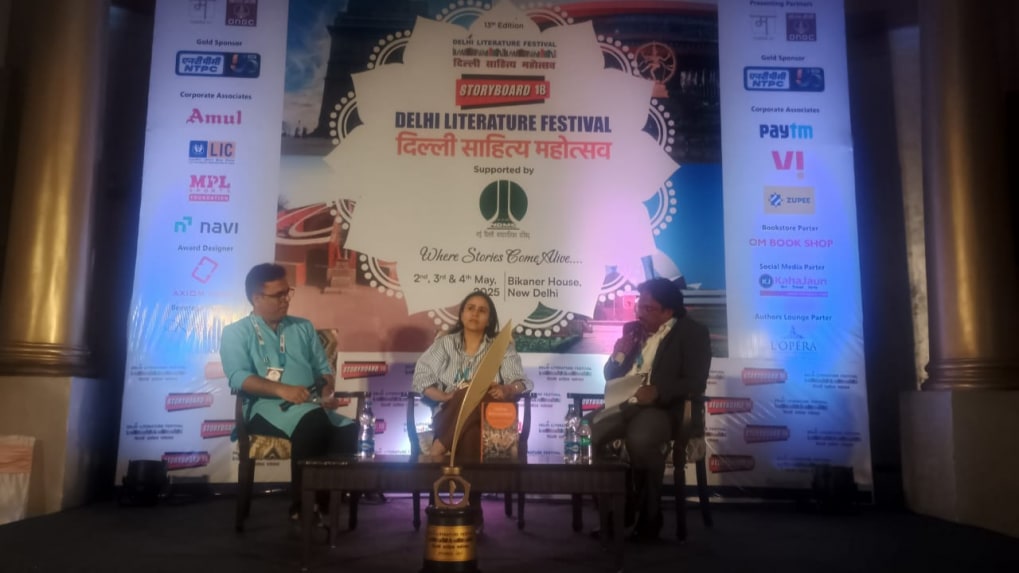The Modi Decade: Political shifts and cultural recalibration explored at DLF 2025
A panel discussion at the Delhi Literature Festival delved into the profound political, social, and cultural shifts under Prime Minister Modi’s leadership, as explored in the anthology Indian Renaissance: The Modi Decade.
ADVERTISEMENT
At the Storyboard18 Delhi Literature Festival 2025, a compelling panel discussion centered on the newly released anthology Indian Renaissance: The Modi Decade, featuring author Dr. Aishwarya Pandit, Utpal Kumar, Opinion Editor at Firstpost and News18, and Sudesh Verma. The conversation delved into India’s dramatic transformation under Prime Minister Narendra Modi’s leadership.
Published by Westland, Indian Renaissance: The Modi Decade offers a comprehensive exploration of India’s political, economic, social, and cultural evolution over the past decade. Through the lens of global experts, political analysts, and policymakers, the anthology provides a multifaceted perspective on India’s shifting governance model, development trajectory, and evolving position on the world stage.
The book, launched by Union Home Minister Amit Shah in January 2025, reflects on the significant milestones of Modi’s tenure, prompting reflection on both his domestic policies and his foreign diplomacy.
Kumar, reflecting on the decade from 2014 to 2024, characterized it as a historically pivotal period for India, drawing comparisons to other transformative moments in the nation’s past. He argued that the full import of certain events, such as the abrogation of Article 370, would only be fully understood in hindsight. “We’re living through a chapter that future generations will study. Yet, even now, much of mainstream discourse fails to capture its magnitude,” Kumar remarked.
Dr. Pandit highlighted one of Modi’s defining legacies: a recalibrated foreign policy that is grounded in pragmatic national interests, rather than ideological sentiment or historical baggage. She pointed to India’s neutral stance on the Russia-Ukraine conflict and its increasingly strategic engagement with the Middle East as examples of diplomatic maturity. “Prime Minister Modi evaluates responses in light of historical precedents, including the nature of India-Pakistan relations, and responds with informed, nuanced decision-making,” Dr. Pandit explained.
A central theme of the discussion was India’s evolving cultural and civilizational identity, with both panelists noting a significant shift towards embracing the concept of Bharat as opposed to the colonial-era conception of India. This ideological reorientation, they argued, reflects broader changes in the country’s self-perception and global positioning.
The conversation also touched on Modi’s unconventional approach to governance, with both Kumar and Verma emphasizing the Prime Minister’s outsider status and his ability to bypass traditional power structures in favor of efficient, action-oriented leadership. “He brings implementation to the forefront. Where previous governments would deliberate, Modi acts - whether incrementally or through bold, sweeping reforms,” Verma noted.
The panel also examined the tangible impacts of Modi-era policies, particularly those aimed at empowering women. Verma highlighted initiatives such as the Lakhpati Didi program, direct benefit transfers, and the ban on Triple Talaq as key mechanisms of empowerment and grassroots mobilization. “These are not mere welfare schemes; they are instruments of dignity and self-reliance,” he stated.
As the discussion unfolded, it was clear that the panelists shared a conviction: Modi’s tenure, while controversial, has indelibly shaped India’s political landscape, positioning it as a rising global power with an assertive national identity.


